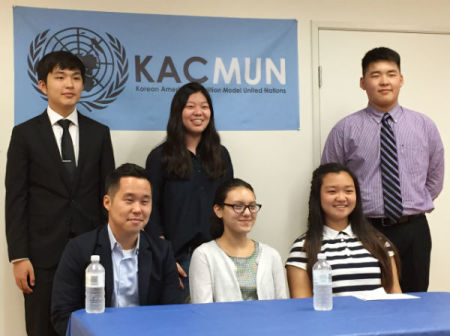
In a rapidly changing world, where global challenges demand innovative solutions, it is imperative that young minds are equipped with the knowledge, skills, and perspective to navigate the complexities of international relations. Model United Nations (MUN) conferences have emerged as a pivotal platform for grooming the leaders of tomorrow, and the Kuwait American Cooperative School Model United Nations, or KACMUN, stands out as a beacon of enlightenment and empowerment. In this article, we will delve into the significance of KACMUN in shaping future leaders in Kuwait and beyond.
The Essence of KACMUN
KACMUN, short for Kuwait American Cooperative School Model United Nations, is an annual event that brings together students from various educational backgrounds to simulate the workings of the United Nations. Held in Kuwait, this conference serves as an educational and transformative experience for young individuals, providing them with a deeper understanding of global affairs, diplomacy, and the art of negotiation.
Fostering Diplomacy and Global Awareness
One of the primary objectives of KACMUN is to nurture diplomatic skills and global awareness among its participants. Students who engage in KACMUN gain firsthand experience in researching, debating, and resolving pressing international issues. These experiences not only enhance their understanding of global affairs but also sharpen their critical thinking, research, and public speaking abilities.
KACMUN is a microcosm of the real United Nations, with participants representing different countries and debating issues that mirror those discussed on the global stage. Through these simulations, students develop a profound sense of empathy and understanding for diverse perspectives, fostering a culture of tolerance and collaboration.
Building Leadership Skills
Leadership is a vital skill that goes beyond holding a position of authority. KACMUN recognizes the importance of leadership development in today’s youth and actively cultivates it through various means. Participants are encouraged to take on roles such as committee chairs, moderators, and even conference organizers. These roles require them to exhibit leadership, time management, and organizational skills.
Moreover, KACMUN provides a platform for students to engage in public speaking, negotiation, and conflict resolution, all essential elements of effective leadership. As they navigate complex diplomatic scenarios, they learn to work collaboratively, communicate effectively, and find common ground—a valuable skill set for any future leader.
Fostering Cultural Exchange
KACMUN is a melting pot of diverse cultures and backgrounds. Students from Kuwait, as well as international participants, converge at the conference, bringing with them unique perspectives, experiences, and cultural insights. This diverse environment allows for meaningful cultural exchange, breaking down stereotypes and fostering a sense of global citizenship.
Through KACMUN, participants learn to appreciate the richness of cultural diversity and recognize the shared humanity that unites us all. This cultural exchange not only broadens their horizons but also prepares them to engage in a globalized world with an open mind and a respectful attitude towards different cultures and traditions.
Networking Opportunities
KACMUN provides an unparalleled opportunity for networking. Participants, including students, teachers, and guest speakers, come from various corners of the world. The connections made at KACMUN often extend beyond the conference, paving the way for lifelong friendships and professional collaborations.
The networking aspect of KACMUN is particularly significant for students aspiring to pursue careers in diplomacy, international relations, or related fields. It offers them a chance to interact with diplomats, educators, and experts in the field, providing valuable insights and guidance for their future endeavors.
The Impact Beyond KACMUN
The impact of KACMUN goes far beyond the conference itself. Graduates of KACMUN often go on to excel in their chosen fields, leveraging the skills and knowledge they acquired during their participation. Many former KACMUN participants have pursued careers in diplomacy, politics, journalism, and academia, contributing to the betterment of their communities and the world at large.
Furthermore, KACMUN alumni frequently return to the conference as guest speakers, mentors, or organizers, passing on their experiences and knowledge to the next generation of participants. This cyclical nature of learning and mentorship underscores the enduring impact of KACMUN.
Challenges and Opportunities
While KACMUN has undeniably made a profound impact on the lives of its participants, it also faces its fair share of challenges. One of the primary challenges is ensuring accessibility to a broader range of students. Financial constraints and logistical issues can limit the participation of some talented individuals. Therefore, efforts to secure sponsorships, scholarships, and expand outreach are crucial to address this challenge.
Additionally, KACMUN continually seeks ways to adapt to the evolving global landscape. As new global issues emerge and technology reshapes communication and diplomacy, KACMUN must stay ahead of the curve to provide relevant experiences and training for its participants.
Conclusion
In a world where diplomacy and global cooperation are more critical than ever, KACMUN plays a pivotal role in shaping the leaders of tomorrow. By fostering diplomacy, global awareness, leadership skills, and cultural exchange, this conference empowers young individuals to tackle complex global challenges with confidence and compassion.
KACMUN’s impact extends far beyond the confines of the conference room, as its alumni continue to make meaningful contributions to their communities and the world. As KACMUN evolves to meet the changing demands of the 21st century, it remains a beacon of hope and enlightenment, uniting tomorrow’s leaders in Kuwait and beyond to create a brighter, more interconnected world

